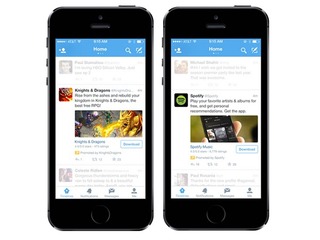DUOS expands AI capabilities to help seniors apply for assistance programs
It will complete and submit forms, and integrate with state benefit systems
Read more...
(Story updated to reflect this as the opinion of Omar Restom, not LinkedIn as a company as previously reported)
Google recently made an announcement that it would start to downgrade mobile web pages that show an app install interstitial that hides a significant amount of content. Those sites would be not be deemed "mobile friendly" and would lose standing in Google's search results.
You know who isn't happy about that? Those that make a lot of money either by showing their own ad, or through their network of ad traffic. That seems to be especially popular with social media companies, especially Twitter and Facebook, who have created whole ad networks out of running mobile install ads.
Now a LinkedIn employee has taken Google to task for the decision, writing in a blog post on Wednesday that Google the numbers it was was using to justify this action were "quite flawed."
In its original report, Google found that only 9% of the visits resulted in clicks, with a 69% bounce rate. LinkedIn released its own numbers showing a 14% click-thru-rate for its ads, as well as a much lower 26% bounce rate.
To Omar Restom, a mobile product manager for LinkedIn, the difference between these two numbers comes from the fundamental flaw in Google's study: that it was basing the results on ads for the Google+ app, which is not exactly the most popular service out there.
"Let's face it, Google+ hasn't caught on with the mainstream. Even Google doesn't want Google+!" Restom wrote. "Naturally, an interstitial that interrupts the user experience to promote something that most people don't want is bound to backfire. Google shouldn't extrapolate based on this one case."
It is hard to argue with that reason considering that Google+ was so unpopular that Google essentially killed it earlier this year.
Restom also blamed Google's numbers on the audience that were being shown these ads; rather than showing them to the target audience, a.k.a. people who haven't downloaded it yet, they were showing it to people who already had installed it.
"Google admits that it was showing their interstitial even to users who already have the app - that's bad mojo and fundamentally bad audience targeting," he said. "Again, Google should only have shown this promo to people who actually want and need the app. The Google+ Team also violated Google's own SEO policy by showing this interstitial on SEO Pages."
LinkedIn, he maintained, had tried their hardest to create an "interstitial page as delightful and interesting as possible."
"Done right, even promos can be delightful!" said Restom.
LinkedIn is not the first company to call Google out for its numbers. When the report first came out, it was also blasted by Jeremy Stoppelman, CEO of Yelp.
@jeremys is this about protecting consumers or protecting their search monopoly?
— Jeremy Stoppelman (@jeremys) July 24, 2015
I'd imagine that Twitter and Facebook are both equally unhappy about Google's decision as well, given how much success they have had with running these ads in-feed on their own networks.
Introduced in October 2012, Facebook’s Mobile App Install ads saw 245 million apps installed by the end of 2013 and accounted for hundreds of millions in revenue for the company. In the wake of that success, Twitter introduced its own mobile app install ad product last year.
Neither Facebook nor Twitter cover the whole screen, but this could very well the first step toward punishing any mobile sites that run these types of ads. It will also possibly deter app developers from wanting to run them in the first place.
Ultimately, this decision by Google could have a big effect on ad revenue.
Mobile app install ads are big business. According to data from BI Intelligence, US mobile app-install ad revenue will top $4.6 billion in 2015, and grow to $6.8 billion by the end of 2019, increasing by a compound annual growth rate of 14% from 2014.
It also believes that mobile app install ads accounted for about 30% of mobile ad revenue last year. So you better believe there's going to be some push-back from those who are raking it in right now on the backs on these ads.
VatorNews has reached out to Google for comment. We will update this story if we learn more.
(Image source: thenextweb.com)
It will complete and submit forms, and integrate with state benefit systems
Read more...The bill would require a report on how these industries use AI to valuate homes and underwrite loans
Read more...The artists wrote an open letter accusing OpenAI of misleading and using them
Read more...
